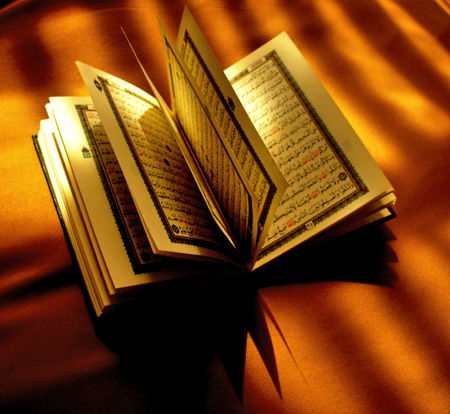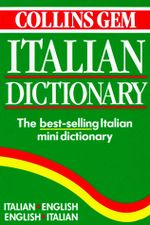Difference between revisions of "Category:Early Islamic Studies--Italian"
| Line 107: | Line 107: | ||
|logo= history.png | |logo= history.png | ||
|px= 38 | |px= 38 | ||
|content= [[File:Italian dictionary.jpg| | |content= [[File:Italian dictionary.jpg|150px]] | ||
}} | }} | ||
Revision as of 01:49, 8 June 2015
|
Overview Because of its geographical location at the center of the Mediterranean and its historical role of bridge between Europe and the Middle East, Italy has played a central role in the development of Early Islamic Studies.
The first Italian translation of the Qur'an, authored by the Florentine Andrea Arrivabene in 1547, was the first translation ever made into a modern language. Although the Author claimed to have translated the text from the Arabic, his Italian version was based on the Latin version by Robert of Ketton (Lex Mahumet pseudoprophete, c1143), which had been just printed by Theodor Bibliander in 1543. Arrivabene's work originated the first versions of the Qur'an into German and Dutch.
No major work in Italian in the field of Early Islamic Studies was published during the 17th century in the field of Early Islamic Studies. In 1698 Ludovico Marracci, a catholic priest and professor of Arabic at the University La Sapienza of Rome, published a new Latin translation of the Qu'ran from the original Arabic text, which largely improved on the previous translations.
In the 18th century the contribution of Italian authors to Early Islamic Studies was limited to the translation of the Life of Muhammad by Henri de Boulainvilliers. Following the success of Voltaire's "Mahomet le prophet," which was translated into Italian by Melchiorre Cesarotti in 1762, Alberto Baccanti composed a pome on the the figure of Muhammad. The only original piece of scholarship in Italian was the Saggio sull'origine, culto, letteratura e costumi degli arabi avanti il pseudoprofeta Maometto by Simone Assemani.
In the early 19th century University of Parma Professor Giovanni Bernardo De Rossi publihed the important "Dizionario storico degli autori arabi più celebri e delle principali loro opere" (1807). In 1817 librettist Felice Romani adapted Voltaire's play to the stage; the opera, set to music by composer Peter von Winter, premiered at the Teatro alla Scala in Milan.
No major work in Italian was published in the second half of the 19th century in the field of Early Islamic Studies.
At the beginning of the 20th century the works of Leone Caetani mark the rise of the Italian School of Early Islamic Studies.
At the beginning of the 20th century the works of Leone Caetani mark the rise of the Italian School of Early Islamic Studies. In the 1920s and 1930s, authors such as Giuseppe Sacco, Bruno Ducati, and others, published important contribution to the field. In 1929 Luigi Bonelli authored a new translation of the Qur'an as well as a critical edition of the Arabic text in 1937. Works by Émile Dermenghem and Tor Andræ were also translated into Italian.
After the World War II, the Italian School continued its work with a new translation of the Qur'an by Alessandro Bausani in 1955.
Great international acclaim gained in the 1960s the work of Francesco Gabrieli, which was translated into Spanish, English and German.
In the 1970s the leading figure in the field was Sergio Noja. A new translation of the Qur'an appeared, by Federico Peirone in 1979.
A new translation of the Qur'an appeared, by Cherubino Mario Guzzetti in 1989. In the 1990s and 2000s the growing Muslim presence in Italy has caused the emergence of an Italian Muslim Scholarship. In 1994 Hamza Roberto Blasone published the first Italian translation of the Qur'an authored by an Italian Muslim scholar. The work is still the "official" translation used by the majority of Muslims in Italy. Best known among Italian Muslim authors was Gabriele Mandel, whose work was widely translated in English, French, German, Spanish and other European languages. The tradition of Italian non-Muslim Arabists has been continued by Claudio Lo Jacono, Roberto Tottoli, Paolo Branca and Massimo Campanini.
The growing public interest in the history, culture, and religion of Islam is testified in recent years by the increasing number of publications and translations of scholarly and fictional works in the field.
Noticeable Works |
2010s (Top) -- 2000s (Top) -- 1990s (Top) -- 1980s (Top) -- 1970s (Top) -- 1960s (Top) -- 1950s (Top) -- 1940s (Top) -- 1930s (Top) -- 1920s (Top) -- 1910s (Top) -- 1900s (Top) -- 1850s (Top) -- 1800s (Top) -- 1700s (Top) -- 1600s (Top) -- 1500s (Top) -- 1400s (Top) --Pre-Modern (Top) -- Medieval (Top)
English -- French -- German -- Italian -- Spanish -//- Arabic -- Croatian -- Czech -- Danish -- Dutch -- Estonian -- Greek -- Hebrew -- Hungarian -- Japanese -- Latin -- Maltese -- Persian -- Polish -- Russian -- Serbian -- Slovenian
|
Pages in category "Early Islamic Studies--Italian"
The following 83 pages are in this category, out of 83 total.
1
- == == 1500s == == ==
- (+) L'Alcorano di Maometto (The Alquran of Muhammad / 1547 Arrivabene), book
- == == 1600s == == ==
- == == 1700s == == ==
- ~~ Early Islamic Studies 1700s ~~
- Vita di Maometo = La vie de Mahomet (The Life of Mahomet / 1745 Boulainvilliers), book (Italian ed.)
- Il Maometto = Mahomet le prophete (Mahomet the Prophet / 1762 Voltaire / Cesarotti), play (Italian ed.)
- Saggio sull'origine, culto, letteratura e costumi degli arabi avanti il pseudoprofeta Maometto (Essay on the Origin, Religion, Literature and Customs of the Arabs before the Pseudo-Prophet Muhammad / 1787 Assemani), book (Italian)
- Maometto (Muhammad / 1791 Baccanti), poetry (Italian)
- == == 1800s == == ==
- ~~ Early Islamic Studies 1800s ~~
- Dizionario storico degli autori arabi più celebri e delle principali loro opere (1807 De Rossi), book (Italian)
- Maometto (Muhammad / 1817 Winter / Romani), opera (music & libretto), Milan premiere
- == == 1850s == == ==
- ~~ Early Islamic Studies 1850s ~~
- == == 1900s == == ==
- ~~ Early Islamic Studies 1900s ~~
- Annali dell'Islam (Annals of Islam / 1905-1926 Caetani), book
- == == 1910s == == ==
- ~~ Early Islamic Studies 1910s ~~
- Maometto, profeta d'Arabia (Muhammad, Prophet of Arabia / 1910 Caetani), book
- == == 1920s == == ==
- ~~ Early Islamic Studies 1920s ~~
- Le credenze religiose di Maometto (The Religious Beliefs of Muhammad / 1922 Sacco), book
- Il Corano (The Qur'an / 1929 Bonelli), book
- == == 1930s == == ==
- ~~ Early Islamic Studies 1930s ~~
- Maometto (Muhammad / 1931 Ducati), book (Italian)
- Maometto = La vie de Mahomet (The Life of Mahomet / 1933 Dermenghem / Marelli), book (Italian ed.)
- Maometto: la sua vita e la sua fede = Mohammed: sein Leben und sein Glaube (Mohammed: The Man and His Faith / 1934 Andræ / Gabrieli), book (Italian ed.)
- Il Corano: testo arabo (The Qur'an: Arabic Text / 1937 Bonelli), book
- == == 1940s == == ==
- ~~ Early Islamic Studies 1940s ~~
- == == 1950s == == ==
- ~~ Early Islamic Studies 1950s ~~
- Il Corano (The Qur'an / 1955 Bausani), book
- == == 1960s == == ==
- ~~ Early Islamic Studies 1960s ~~
- Il Corano è contro la Bibbia? = Bible et Coran (The Bible and the Koran / 1961 Jomier / Galetto), book (Italian ed.)
- (++) Maometto e le grandi conquiste arabe (Muhammad and the Conquests of Islam / 1967 Gabrieli), book
- Maometto (Muhammad / 1967 Mandel), book
- Il Corano (The Qur'an / 1967 Moreno), book
- == == 1970s == == ==
- ~~ Early Islamic Studies 1970s ~~
- Maometto = Mahomet (Muhammad / 1972 Rodinson / Minerbi), book (Italian ed.)
- Maometto, profeta dell'Islàm (Muhammad, Prophet of Islam / 1974 Noja), book
- Maometto, profeta e uomo di Stato = Muhammad: Prophet and Statesman (1974 Watt / Rizzitano), book (Italian ed.)
- Il Corano (The Qur'an / 1979 Peirone), book
- == == 1980s == == ==
- ~~ Early Islamic Studies 1980s ~~
- Maometto e la tradizione islamica = Mahomet et la tradition islamique (Muhammad and the Islamic Tradition / 1983 Dermenghem / ???), book (Italian ed.)
- Il profeta Maometto: la sua vita secondo le fonti più antiche = Muhammad: His Life Based on the Earliest Sources (1988 Lings / Volpe), book (Italian ed.)
- L'islam e il suo Corano (Islam and Its Qur'an / 1988 Noja), book
- Il Corano (The Qur'an / 1989 Guzzetti), book
- == == 1990s == == ==
- Il Corano senza segreti (The Qur'an without Secrets / 1991 Mandel), book
- Maometto = Mahomet (Muhammad / 1993 Delcambre / Zaccarini), book (Italian ed.)
- Il Corano (The Qur'an / 1994 Piccardo), book
- Bibbia e Corano (The Bible and the Qur'an / 1995 Bonanate), book
- L'uomo del libro = L'homme du livre (Muhammad / 1995 Chraïbi / Colace), novel (Italian ed.)
- Maometto: l'inviato di Dio (Muhammad: God's Messenger / 1995 Lo Jacono), book
- Le parabole nel Corano (Parables in the Qur'an / 1999 Mandel), book
- I profeti biblici nella tradizione islamica (Biblical Prophets in the Qur'an and Muslim Literature / 1999 Tottoli), book
2
- == == 2000s == == ==
- Corano e Bibbia (Qur'an and Bible / 2000 Tottoli), edited volume
- Il Corano (The Qur'an / 2001 Branca), book
- Maometto il profeta (Muhammad the Prophet / 2001 Mandel), book
- Maometto = Mohammed (Muhammad / 2002 Bobzin / Tottoli), book (Italian ed.)
- Pace e guerra nella Bibbia e nel Corano (Peace and War in the Bible and the Qur'an / 2002 Stefani, Menestrina), edited volume
- Il Corano e il male (The Idea of Evil in the Qur'an / 2002 Zilio-Grandi), book
- Maometto = Muhammad (2004 @1991 Armstrong / Pastore), non-fiction (Italian ed.)
- Il Corano e la sua interpretazione (The Qur'an: The Basics / 2004 Campanini), book
- Il Corano (The Qur'an / 2004 Mandel), book
- Bibbia e Corano: che cosa li unisce, che cosa li divide = Bibel und Koran: was sie verbindet, was sie trennt (Bible and Qur'an: What Unites, What Divides / 2006 Gnilka / Colombo), book (Italian ed.)
- A'isha, l'amata di Maometto = The Jewel of Medina (2008 Jones / Beltramini), novel (Italian ed.)
- Il silenzio di Maometto = Le silence de Mahomet (The Silence of Mohammed / 2009 @2008 Bachi / Amaducci), novel (Italian ed.)
- == == 2010s == == ==
- Maometto e le origini dell'Islam (2011 Donner / Tottoli, Arlorio) = Muhammad and the Believers (2010 Donner), book (Italian ed.)
- Maometto (Muhammad / 2011 Lo Jacono), book
- I Nazareni e il Corano = Die Nazarener und der Koran (The Nazareans and the Qur'an / 2012 @2007 Gnilka / Florioli), book (Italian ed.)
Media in category "Early Islamic Studies--Italian"
The following 5 files are in this category, out of 5 total.
- 1938 Di Matteo.jpg 180 × 236; 9 KB
- 1991 Giustolisi - Rizzardi.jpg 351 × 500; 44 KB
- 2009-T Goldhill it.jpg 344 × 499; 35 KB
- 2011 Gamberini.jpg 185 × 273; 6 KB
- 2018 Martinelli.jpg 354 × 499; 20 KB






